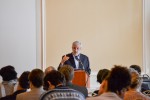International and domestic government officials discussed how to solve the global refugee crisis at a day-long forum at the UCLA Faculty Center on Friday.
Several UCLA centers organized the Global Refugee Crisis Conference, including the Center for the Study of International Migration, the Center for European and Russian Studies, the Center for Near Eastern Studies and the UCLA International Institute.
Scott Waugh, UCLA executive vice chancellor and provost, gave introductory remarks to the conference and then introduced a speaker.
T. Alexander Aleinikoff, former United Nations deputy high commissioner for refugees who was one of the speakers at the event, examined how the international community could improve the way it addresses refugees in a talk titled “Repairing a Broken International Refugee Regime.”
There are 60 million refugees around the globe, Aleinikoff said.Though states are often willing to host asylum seekers, many refugees remain in temporary host countries for five or more years without immediate asylum prospects of durable long-term solutions, he said.
Aleinikoff said these refugees were in second exile, after a first exile of initial displacement from their home countries.
Host country governments usually dispense aid to refugees in second exile, but often deny them freedom of movement, right to work or access to education, which limits their integration into society, he said.
Aleinikoff said host country governments also deny refugees a political voice.
“Because refugees are not part of a political society, no one listens to them,” he said. “They are not part of the conversation on issues that affect them.”
Aleinikoff added host countries often set up refugees to live in a state of dependence rather than self-reliance.
He also said host countries frequently fail to enforce refugees’ rights outlined in the United Nations 1951 Refugee Convention, such as the access to education.
He said he thinks countries do not enforce these rights because they do not believe it is in their political interest to do so. He added it is very difficult to persuade states to act against their interests, especially given there is no established system to ensure such accountability.
Aleinikoff said he thinks the international community can support refugee rights by enforcing consequences for perpetrators of events that caused displacement in refugees’ home countries.
Aleinikoff concluded by saying he thinks citizens can help alleviate the second exile situation by being politically vocal about refugee rights in their countries.
“Self-interest of state is defined by politics of state,” he said. “So we can all fix it because we can all take part in political system.”
[Related: EU ambassador addresses UCLA community regarding refugee crisis]
Other speakers at the conference included Anne C. Richard, former assistant secretary of state for population, refugees and migration, and Jean-Marc Gionet, director of resettlement for Immigration, Refugees and Citizenship Canada, a department of the Canadian government.
Some people in the audience attended because they were personally connected to the refugee crisis.
Marina Ingman, who is not affiliated with UCLA, said she attended the event because she was once a refugee.
“I felt both sympathetic and obliged to understand and help the situation,” Ingman said. “(Through this conference) I hope to gain information necessary to participate as a citizen in the system of government.”
